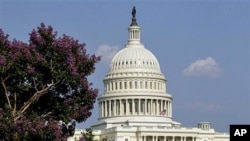In U.S. debt negotiations, whether to raise taxes has been a major stumbling block to a far-reaching deficit reduction plan and an increase in the federal borrowing limit. Most Republicans reject President Barack Obama’s call for a mix of spending cuts and higher taxes to improve government finances. But tax hikes were a common element of deficit-cutting plans of past decades, including one notable bill signed into law by a Republican president.
In assessing America’s fiscal woes, Republicans, like Senator Jon Kyl of Arizona, point out that federal spending is at an all-time high.
“Our problem is not that we are taxed too little. Our problem is we are spending way too much,” he said.
Democrats counter that tax revenues as a percentage of economic output are at their lowest level since the 1950s. But Republicans argue that raising taxes would enable the government to spend even more, instead of reducing the $1.5 trillion federal deficit. Senator John Cornyn of Texas, said, “I fear that so much of what we are hearing about tax increases is just to allow the spending binge to continue, and Washington will not change its ways.”
Trust factor lacking
In addition to a budget deficit, Washington appears to be hobbled by a deficit of trust. Like most Republicans, Representative Jim Jordan of Ohio does not believe Democrats will follow through on promised spending cuts.
“We are not falling for that game anymore. We are not going to let you promise spending cuts later to raise taxes now,” said Jordan.
Painting Democrats as spendthrifts is not new. In 1990, many Republican lawmakers blasted a plan to trim the federal deficit by hundreds of billions of dollars by cutting three dollars in spending for every one dollar in higher taxes. Then-Representative Gerald Solomon of New York predicted the spending cuts would never materialize.
“We are going to submit the second-largest tax increase in the history of this country with no enforcement that this Congress is going to give any spending cuts at all,” Solomon said.
Pledge comes back to haunt
Back then, as now, many Republicans had vowed to oppose any and all tax increases. The most famous pledge came from then-Vice President George H. W. Bush at the 1988 Republican National Convention.
“Read my lips: no new taxes,” Bush said. He went on to win the presidential election that year.
In 1990, the ranking Republican on the House Budget Committee was Congressman Bill Frenzel. Frenzel said Republicans hated breaking the no-tax pledge.
“The worst part was for President Bush himself. He made the pledge honestly, would like to have lived up to it, agonized over it," said Frenzel. "In the end [Bush] said, ‘I cannot run the country with that pledge hanging over my head. I am going to have to make a deal with the Democrats’.”
1990 tax deal re-examined
The 1990 deal boosted the top income tax rate and raised the tax limit for Medicare. Today, not even Democrats believe a stand-alone tax hike is politically viable. The most Republicans have offered is an elimination of certain tax exemptions in return for an overall lowering of tax rates.
President George H. W. Bush would lose his reelection bid in 1992. To this day, according to Frenzel, Republicans blame the loss on the president’s violation of his no-tax pledge - and point to it as a warning for anyone in their ranks who would consider compromising with Democrats to boost federal revenue.
Yet budget analysts view the 1990 deal as a success. America’s finances dramatically improved during the 1990s, generating surpluses by the end of the decade. Frenzel now co-chairs the nonpartisan Committee for a Responsible Federal Budget. He said, contrary to Republican fears about the federal government’s ability to limit spending, budget caps have worked in the past and can work again.
“It was the Budget Enforcement Act of 1990 that really was the basis for the four years in the black [surpluses] in the Clinton administration.”
Under President Bill Clinton, taxes on the wealthy rose even further. The U.S. economy recorded the highest growth rates of the post-World War II era.
Obama has urged a mix of spending cuts and tax increases to slow the growth of the national debt. The three-to-one ratio advocated by the administration would mirror the 1990 budget deal. But while America’s fiscal woes are arguably more severe now than they were in 1990, Republican resistance to stand-alone tax hikes appears greater today than ever before.














